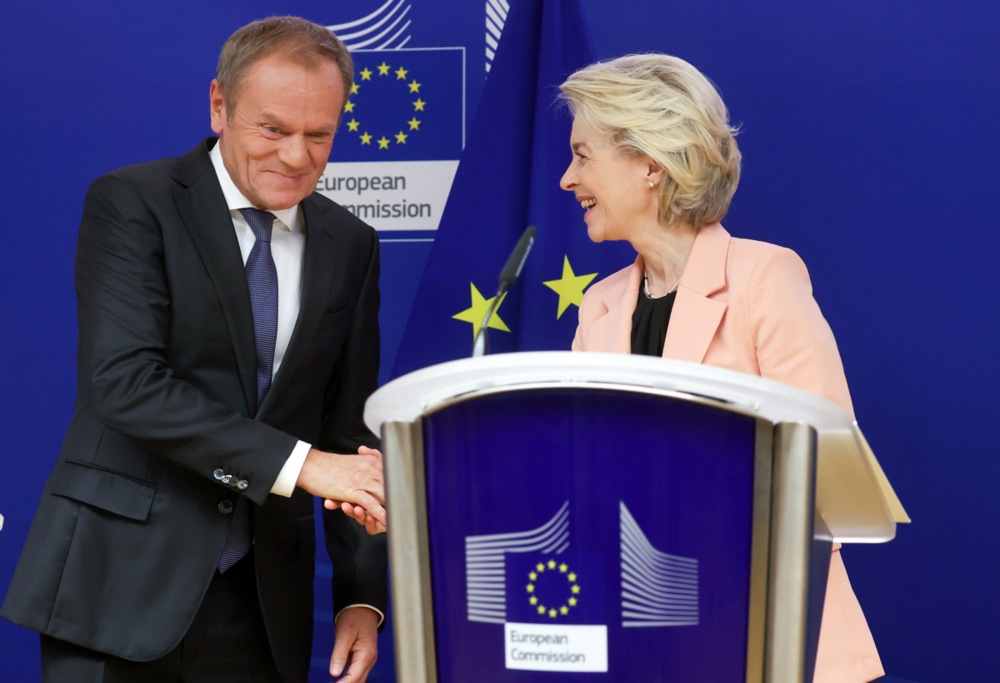When Polish Justice Minister and General Prosecutor Waldemar Żurek sat down in his office a week ago to record a piece of video for his social media accounts, he was visibly delighted. His body language and tone of voice emphasised his conviction that we are witnessing a breakthrough: “My dear friends. An extremely important court verdict has been issued by the Court of Justice of the European Union [CJEU]. I will give you the reference number, because lawyers like such things – C-22/22. What did the Court say? ‘The national court cannot ignore the fact that it refused to grant the Extraordinary Control and Public Affairs Chamber of the Polish Supreme Court the status of a court because that Chamber does not meet the requirements of independence and impartiality laid down in EU law.”
This verdict is extremely important for all of us, said Żurek, a politically active former judge and one of the hawks in the camp opposing the judicial reforms undertaken by the former government led by the right-wing Law and Justice party.
He added a threat: Judges who do not recognise the verdict and wear their judicial robes illegally, in his opinion will have to pay compensation for wrongful judgments out of their own pockets. He also stressed that this is definitive proof of the “principle of EU primacy” – in matters of the justice system.
However, contrary to Minister Żurek’s hopes, there has been no breakthrough following the decision by the CJEU.
Here is the reasoning that makes Poles look at the European judgement and go, “So what?” Zbigniew Ziobro, the former Minister of Justice, now a Member of the European Parliament, said about the ruling: “This pseudo-judgment, commissioned for political reasons, has one main goal. Poles are not allowed to change the judiciary if it is not to Brussels’ liking. EU law has nothing to do with it. The European treaties clearly state that the organisation of the judiciary is the sole competence of the Member States. Therefore, the matter is outside the jurisdiction of the CJEU. The attempt to interfere in our judiciary is nothing more than a brutal violation of European law and dirty politics.”
This vigorous rejection is new. A few years ago every murmur and hammer blow of European court judges was widely commented on, this latest ruling has only been noticed by lawyers and politicians involved in the dispute. And opinions that the Luxembourg decision will succeed in overthrowing the new president, Karol Nawrocki, who was elected on June 1 and sworn in on August 6, are somewhere in the area of flat earth conspiracy theory. Donald Tusk did not take up the issue, nor did his coalition partners, and President Karol Nawrocki did not comment on it. The national media also quickly forgot the issue.
This is surprising, because the CJEU has stated that any judge of any court can verify whether another judge, including a Supreme Court judge, has been properly appointed. The judgements of such judges may be considered illegal. This also applies to the Chamber of the Supreme Court (the Extraordinary Control and Public Affairs Chamber of the Supreme Court), which approved the result of the recent presidential election, lost by Donald Tusk’s camp.
So, what happened that the long-awaited ruling was ultimately considered so insignificant?
The dispute over the shape of the Polish justice system, which has been going on since 2016, has clearly tired the Polish public. After almost a decade of fierce battles, it has ceased to be an important topic of political struggle. Partial victories by individual parties, CJEU verdicts conflicting with opposing rulings by the Polish Constitutional Tribunal, bills amending bills, personnel changes that no one could follow, have radically reduced the social impact of the conflict. Few people can make sense of it all.
What is clear, however, is how utilitarian the ruling elites in Brussels treat the slogan of the rule of law. During the former Law and Justice Prime Minister Jaroslaw Kaczyński’s rule, every comma of every law was scrutinised, and every action taken against an activist of the then-opposition caused alarm. When Tusk came to power, Brussels turned a blind eye, even though the brutality of the new authorities and the abuse of the justice system for political purposes exceeded all previously known limits. I will only mention here the attempts to liquidate media independent of the authorities, the forceful takeover of public media with the use of the police, attempts to block demonstrations, and the deprivation of funding for the main opposition party, Law and Justice.
The unblocking of money from the EU Recovery Fund shortly after the elections, despite the lack of any changes in the legal system, gave Tusk’s team a few points in the short term. But in the long term, it completely deprived the European Commission of its objectivity. The money was blocked for political reasons, and for the same reasons it was released after the change of government. But if the main condition for the rule of law is that power is in the hands of Brussels’ favourites, then there is nothing left to discuss in terms of substance. What remains is naked political power.
The actions of opponents of the reforms undertaken after 2016 do not improve the situation. Many judges have openly declared their political views, taken part in demonstrations and given political interviews. The communist past of some of them has come to light on numerous occasions. A narrative has been constructed, sometimes deliberately, sometimes accidentally, that judges appointed by the communist authorities are properly appointed, while those appointed by the democratically elected President of the Republic of Poland in the fourth decade of independence are illegal “neo-judges”. It is difficult to ignore in these debates the fact that the judiciary was the only element of the communist state that was not vetted or verified in any way after the fall of the communist dictatorship.
Paradoxically, the tension surrounding the judiciary has decreased because a series of reforms during the terms of Law and Justice government, have increased the effectiveness of the judiciary. For example, remote hearings via video link have been introduced on a massive scale. In socially important matters, such as toxic loans granted in foreign currencies, dedicated courts were established, which, thanks to their specialisation, fasten the pace of work. Fees for certain legal services were officially reduced. Budgets for the judiciary was increased. The passage of time has also played its part. Since the 2017 reform, which shifted the selection of members of the National Council of the Judiciary from the exclusive hands of judges to those of members of the Polish Sejm (although they only select from among judges), more than 3,000 new judges have been appointed (there are about 10,000 in total). In this context, attempts to radically return to the state of affairs before the changes introduced by Jarosław Kaczyński’s camp sound increasingly fantastical.
Indeed, Tusk’s team’s victory in 2023 caused a major personnel revolution. The Ministry of Justice, staffed by its radical opponents led by former Ombudsman Adam Bodnar, began a personnel purge. Court presidents and ordinary judges who had not been involved in the liberal opposition’s earlier activities were labelled “PiS supporters” and demoted en masse. At that time, proposals were made, publicly discussed by Prime Minister Tusk and then-Minister Bodnar, to review judges appointed after 2017. The plan was to divide them into categories of guilt. Some were to be expelled from the profession forever, while others were to be given the opportunity to publicly confess their sins and promise to improve. The guilt was to be the very act of accepting the nomination from the reformed National Council of the Judiciary and the conservative president. The ambitions went far, because the whole process of holding previous governments to account was compared to the new Nuremberg trials, which in a country that had suffered terribly under German occupation during World War II has a shocking connotation.
However, Tusk’s team’s plan had one major soft point: radical in its rhetoric, it was not well thought out in legal terms. It only worked where the direct authority of the minister and the Attorney General reached. The ruling majority was unable to change any laws because President Andrzej Duda was in office at the Presidential Palace. Although in the past, during the Law and Justice government, he had stopped an attempt to completely replace the Supreme Court, he did not give his consent to a counter-revolution in this area.
All the hopes of the current ruling camp rested on the new president. The victory of the liberal mayor of Warsaw, Rafał Trzaskowski, was considered almost certain, and he was expected to sign the relevant bills into law. Among them it was supposed to be an abolition bill, pardoning all crimes committed after 2023 in the name of “restoring democracy”.
However, things turned out differently…
This is Part I of a two-part series. Part II will be published tomorrow.





European Commission’s complicity in Poland’s constitutional breakdown